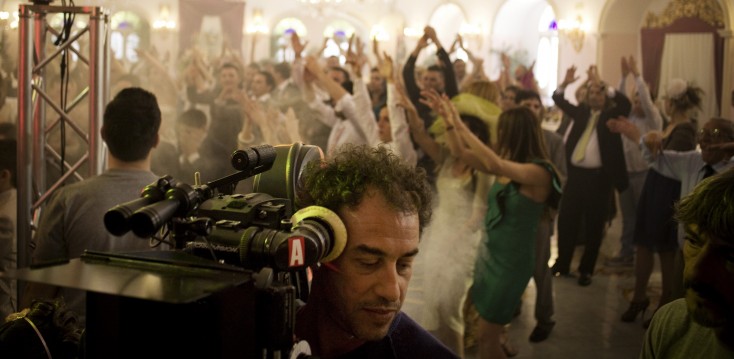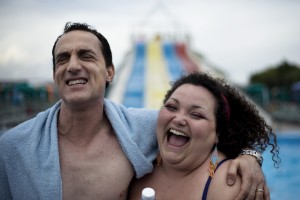By ANGELA DAWSON
Front Row Features
HOLLYWOOD—While the world’s Catholics waited in anticipation for the cardinals to elect a new pope back in his native Italy, filmmaker Matteo Garrone was in the U.S. promoting his newest film “Reality,” which won the Grand Prix prize at Cannes last year. Coincidentally, Garrone’s movie deals with people’s various beliefs in a higher power watching them.
The award-winning filmmaker previously directed the ultra-violent organized crime drama, “Gomorrah,” in 2008. (That film also won the Grand Prix prize at Cannes.) For “Reality,” he opted for lighter fare—at least, lighter for Garrone.
“Reality” is a dark comedy that tells the story of a Naples fishmonger named Luciano (played by Aniello Arena) who is nudged by his family to try out for the reality show “Big Brother.” Initially reluctant, Luciano wangles his way into an audition, and subsequently thinks he has a good shot at getting called back to be a contestant. As he waits and waits and waits, his imagination gets the better of him and he starts to lose his grip on reality. He imagines that the TV show’s organizers are spying on him to see if he is truly worthy of being on the show. He starts giving away his personal possessions, much to his wife’s chagrin. He even sells his business, certain he will soon be on easy street after he gets on the show.
Meantime, his cousin, with whom he has a side business scamming the government by buying unneeded pasta makers from the elderly, urges Luciano to put his faith in God. The two head from Naples to Rome, ostensibly to see the pontiff deliver an address at St. Peter’s Square, but Luciano has other plans while in the capital.
Garrone, who was inspired to write “Reality” with his co-writers, explained that the film is really about people’s dreams of an artificial paradise and not a statement about reality television. “Big Brother,” the show, is merely a plot device, he says.
For his lead, Garrone turned to an unlikely source—the prison system.
“I remembered a theater company my father used to use—one that operated inside a prison,” he says.
It was at the Fortezza Theatre Company at the Volterra Detention Center that he found Arena, who has been incarcerated for 20 years. Every day, Arena would be escorted from the prison to the set and every night he would be returned to his cell. Garrone explains that the inmate/thespian had the right look and acting chops for the part. The fact that his lead actor lives behind bars dreaming of an alternate life outside the prison walls was not lost on the director.
Though he has a translator present for an interview, Garrone’s English is impeccable and he only has to resort to a translation once or twice during our meeting. And though he knows some people with connections to the Vatican, he has no idea who will be the next pope.
Q: How long ago did you make this film?
Garrone: We finished in April 2012.
Q: Why did you cast someone who is a prisoner? Was it because you were looking for a particular look?
Garrone: Yes. I was looking for a particular face and body, and Aniello (Arena) was perfect for the character of Luciano. He’s quite a personality and has charisma. Also, the eyes were amazing. He acts with his eyes. It was worth the effort to get him.
Q: Did it make it difficult in terms of shooting, because you had to get him back to prison every night?
Garrone: Yes, like Cinderella. We gave the police our shooting schedule and we tried to stick with the program so the police could come whenever they wanted to check and see where he was. Sometimes, during the shoot, we wanted to change locations maybe because of the weather, but we couldn’t because (Arena had to be where we said he would be). That was the only inconvenience, though.
Q: Did it make it more poignant for him because he plays a man who has a certain life and has a fantasy of a different life?
Garrone: The fantasy is to change your life for many people. That’s the point. Many people aren’t satisfied with what they have. That’s one of the most important aspects of the movie. For Aniello, as a person, things changed 14 years ago when he met a man called Armando Punzo, who is the director of the (prison theater) company. Through him, Aniello started to discover his talent as an actor and he started to discover a new meaning for his life. At that point, his life changed. So he’s an actor now and loves what he does and he has no problem following artificial dreams. He’s very steady. But, of course, the story of Luciano, is the story of a guy who is much more weak from the seduction of the outside. Plus, it’s the story of a guy who is pushed by his family (to get on ‘”Big Brother.”) It’s a story of a society that is contaminated in a way.
Q: Is “Big Brother” still popular in Europe?
Garrone: Not so much. It’s becoming less popular. But that’s not the point. I hope you realize that “Big Brother” is the McGuffin (a plot device) in the movie. It’s not important. For this character, it’s important in the second part of the film, when his problem becomes much more existential in a way. He wants to go on television not just to become famous, but because he wants to prove to everybody that he exists. He’s there. Things change and he starts to think that Luciano himself is not enough. And he starts to think of a new character that he wants to be. This is another aspect that is very modern, very common in our time. It’s something I found very interesting—the relationship between person and character. When I heard this story, it’s one of the aspects that made me decide to develop this story.
Q: What happened to the real guy?
Garrone: After this nightmare, he went to a doctor and took medicine and after a while, he came back and finally he bought his old fish shop in Naples. Now, he works in a fish shop in Naples called Illusion. So the real story has a happy ending.
Q: Has he seen the film?
Garrone: Of course. We worked on the script together. He spoke with Aniello to give him advice with his interpretation and we spoke before we made this movie. He was happy to tell this story.
Q: You purposely left the ending ambiguous. Why?
Garrone: We remained faithful to the story but we invented the last 20-30 minutes when they go to Rome. It’s something we imagined as screenwriters. We liked to put these two forces together: television and the church.
Q: This has been labeled a comedy, and yet it’s such a dark comedy because this guy puts everything on the line for this dream. Is this your idea of comedy?
Garrone: It starts as a comedy and then becomes darker and darker. It starts like a journey of this character and then the journey becomes psychological and introspective and all in his head. It’s like the movie has two different tones.
Q: There is obviously the Fellini influence on this film, but I also detected a bit of Kubrick, especially with that long grand opening shot. Are you a big Kubrick fan?
Garrone: Kubrick is one of my favorite directors ever and so is Fellini and both of them are like each other. It’s probably something that came up unconsciously. There was an early movie of Fellini called the “White Sheik,” which isn’t as well known in the U.S. It’s a pity because it’s a very great movie of Fellini’s, and he made it from a subject of Michelangelo Antonioni. It’s black and white. It was his first movie, and the theme of the movie is very close to “Reality.” The Fellini Foundation had a screening of it with “Reality” about two months ago, and they called the event “The Big Dream.”
Q: You mentioned the religious aspect of this film and, of course, we’re all wondering what’s going to happen with the new Pope in Rome. Any predictions?
Garrone: I’m very curious. I’d like to know more about it. I have a friend who knows a lot of things because he knows some of the cardinals, so I’ll have to call to ask him. But I haven’t yet.
Q: You have the Big Brother and the God element in “Reality.”
Garrone: I discovered when I first heard this story, that there was this character of the cousin, called Michele (played by Nando Paone), who was a real believer. I liked that aspect. There was one that believed in God and the other that believed in Big Brother, so these two talk of God and misunderstanding each other. We developed this element until the end.
Q: Is that real footage of Pope Benedict addressing the crowd at St. Peter’s Square?
Garrone: No. We recreated it. It means we did a good job.





